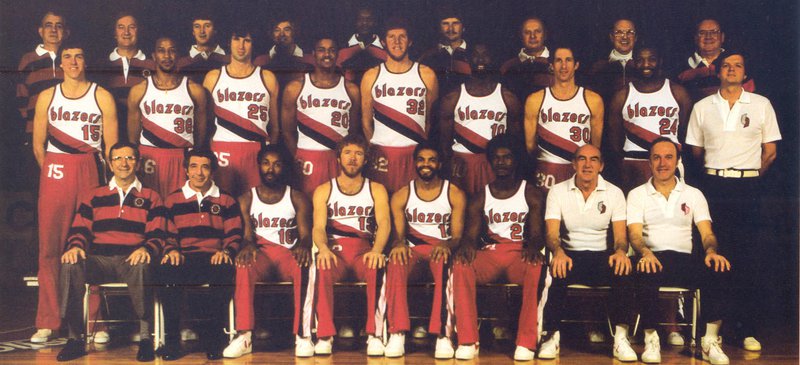
David Twardzik (1950-)
Dave Twardzik, according to Jack Ramsay
I met with Stu Inman, Portland’s director of player personnel, in his office to go over the team’s roster shortly after I took the Trail Blazers coaching job in June of 1976. Stu had the players listed by position on a chalkboard and gave a brief commentary on each one.
When he got to the guards, he paused at Dave Twardzik’s name. “You’ll love Twardzik,” he said. “He’s a tough SOB, gets right in your face on defense, and will run your team offense the way you want it.” I nodded but said nothing. I wasn’t questioning Inman’s opinion, but I’d learned a long time ago to never judge a player until I saw him on my practice floor. I had never seen Twardzik play.
Dave Twardzik grew up in Middletown, Pennsylvania, and starred on the high school basketball team that won the State Class B championship in 1968; but was not recruited by a major college when the high school season ended. After watching Dave play in an all-star game later that spring in Allentown, Sonny Allen, the coach of Old Dominion University, told Dave that he was the perfect point guard to run ODU’s structured fast-break offense and invited him to Norfolk, Virginia, for a campus visit. Twardzik liked what he saw of the university and was intrigued by Allen’s fast-break theories. He enrolled at ODU in the fall of 1968. Dave played three varsity seasons there and fulfilled Coach Allen’s prophecy by running the break effectively while averaging 20 points and 5.5 assists. He led the Monarchs to the NCAA Division 11 finals in 1971, where they lost to the host team, Evansville College.
Both Portland (NBA) and the Virginia Squires (ABA) drafted Twardzik in 1972. The Squires played most of their home games in Norfolk, and Dave liked the idea of playing pro basketball in the same city where he’d gone to college. He signed a five-year contract with Virginia and played four years for the Squires. When the ABA folded, Portland signed him to a new contract in 1976. At training camp in the fall of 1976, Twardzik didn’t show eye-popping natural skills. He had slightly better than average speed, jumping ability, and quickness; but, as Inman had predicted. he was a bulldog-tough defender, made the right play every time on the break, knocked down open jumpers, and was excellent at initiating half-court offense. By the end of training camp, Twardzik was the team’s starting point guard, and he remained in that capacity for all of the 74 games he played that season.
Twardzik and backcourt teammate Lionel Hollins led the Blazers in steals, harassing opposing guards into turnovers with coordinated trapping tactics that resulted in fast-break scores for Portland. Twardzik shot 61 percent from the field (a record-high Portland field goal percentage) and 84 percent from the free throw line, while averaging 10 points and 3.5 assists for the season. Dave was the team’s most consistent player.
Twardzik also had a knack for scoring at the basket against the league’s big shot-blockers with a variety of twist-and-turn moves and under-control, spin-off-the-glass shot releases. Dave took special delight in driving right at the Lakers’ Kareem Abdul-Jabbar, taking the ball into Kareem’s chest and then extending his shooting hand into his face. Kareem didn’t like it. After one such occasion, Abdul-Jabbar grabbed Dave by the throat, lifted him off the floor and glared at him for several seconds before recovering his composure and setting him down on the floor.
Twardzik recalls having no championship illusions before the season began, but rather a feeling of confidence that the Blazers could be a good team, worthy of making the playoffs—something Portland had never done. Then, when that goal was accomplished, the objective changed to winning each series as the team advanced—first against Chicago, then Denver, next Los Angeles, and ultimately against Philadelphia in the NBA Finals.
Twardzik also ranked first in the fun department. He was always ready with a quip or prank that brought humor into the rigors of playing the long, 82-game season. One of his talents was to duplicate the sound of 4 the security buzzer at airports. After passing through the checkpoint himself, Dave waited until an unsuspecting member of the traveling party—broadcaster Bill Schonley was a favorite target—attempted to pass through. Standing off to the side, Dave would imitate the violation sound that would send the suspected passenger through the line again. Sometimes, a sputtering Schonley was sent through the line several times as he deposited his hat, wallet, belt, keys, glasses and pocket change in trays for further inspection or until Twardzik finally relented. The players loved it.
At a practice in Houston, I spotted Dave standing at attention and saluting while the rest of the team was on the floor, preparing to start its pre-practice stretching. Following the direction of his salute, I saw the scoreboard had listed us, the visiting team, as “Poland,” the country of Twardzik’s ancestry, rather than “Portland.” He never seemed to miss an opportunity to lighten the team’s mood.
In 2010, Twardzik’s reflected on that championship season. “What I remember most was the cohesiveness of the players,” he recalled. “We had a new coach with a new system, a lot of new players (seven), and we all gave up something for the good of the team. We all felt good about being a part of this team that kept getting better as the season went along. I never experienced that before. It’s still the best time I ever had in basketball.”

Portland Trail Blazers, 1977-1978. OHS Research Lib.
